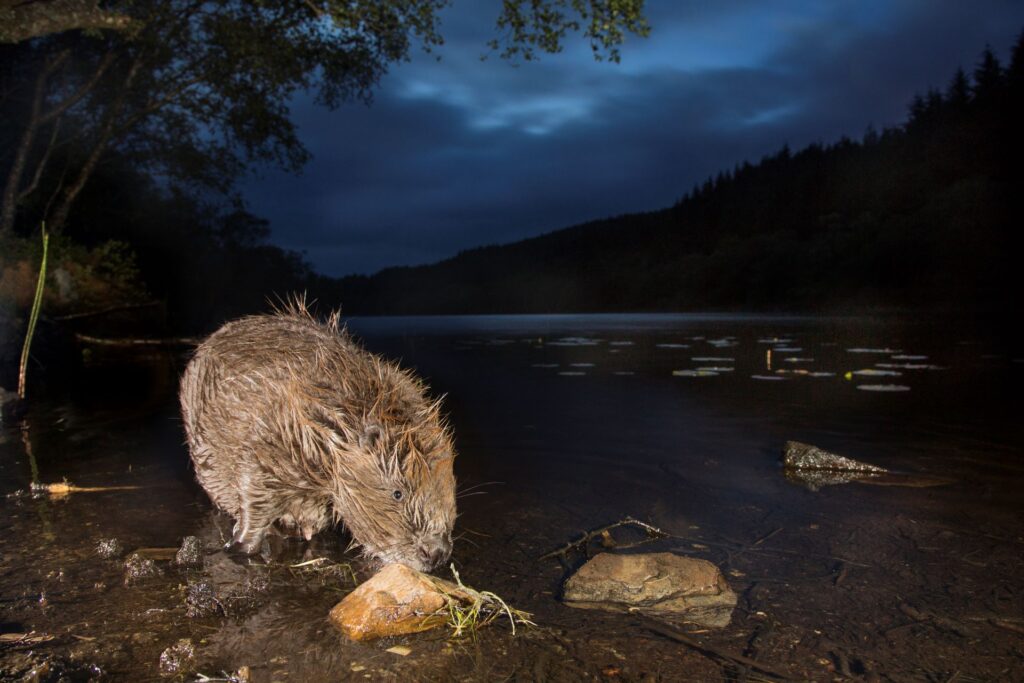Three-quarters of Scots say they want more beaver reintroductions – but government agencies ‘going slow’ despite beaver deaths

Three-quarters of Scots want Scotland’s public bodies to step up action on beaver reintroductions, shows research conducted for the Scottish Rewilding Alliance.
But government agencies are not delivering on a Scottish Government call on them to lead in moving beavers to new areas – resulting in more than two years of inaction and indecision, and missed opportunities for local communities, says the Alliance.
In polling carried out by independent research agency Survation, 73% of respondents said Scotland’s public bodies should identify more sites on their land where beavers could live.
“This is overwhelming public support for bringing back beavers to suitable habitat. Government bodies that manage land on behalf of the public need to listen, and move ahead on reintroducing these key allies in tackling the nature and climate emergencies,” said Kevin Cumming, the Scottish Rewilding Alliance’s Deputy Convenor and Rewilding Britain’s Rewilding Director.
Beavers create wetlands that benefit other wildlife, soak up carbon dioxide, purify water and reduce flooding. They can also bring economic benefits to communities through eco-tourism.
Relocating beavers to suitable wild habitat from agricultural land where they can cause problems also benefits farmers, and saves beavers from being shot. Since 2019, an average of 88 Scottish beavers have been killed under licence annually, potentially 20% of their population.
Yet Scotland’s public bodies have relocated just five beaver families – all within Cairngorms National Park – beyond beavers’ current range since early 2022, when the Scottish Government called on them to upscale action for returning the native species to public land.
“Cairngorms National Park Authority is showing what can be done, with beavers released at several sites, and plans for more over the next five years. Our other public agencies need to play catch-up with the Cairngorms, and end their own go-slow approach to restoring this biodiversity-boosting, flood-reducing, habitat-creating species,” said Kevin Cumming.
The Scottish Government’s nature agency, NatureScot, has identified over 100,000 hectares of ‘beaver core woodland’ across Scotland, where beavers could establish long-term territories, while Scotland’s government bodies manage 10% of public land between them.
Bolder action is especially needed from Forestry and Land Scotland (FLS), the country’s biggest manager of public land, says the Alliance. FLS manages a massive 640,000 hectares of Scotland, including many waterways known to be highly suitable for beavers.
Yet despite its involvement in a potential beaver reintroduction in Glen Affric – a proposal welcomed by a significant majority of the local community in a series of extensive consultations – FLS has yet to welcome back a single beaver to a site beyond the species’ current range.
NatureScot, which issues lethal control licences, has so far failed to lead on beaver relocations to its national nature reserves.
Beavers were driven to extinction in Scotland some 400 years ago, before their official reintroduction in 2016 and recognition as a protected species in 2019. Reintroduction of beavers to new areas requires appropriate habitat assessments and public consultation.
Farmer Tom Bowser, from Argaty near Doune, has reintroduced several beavers to his family farm under licence, saving them from culling. He said: “The beavers have only brought us benefits. Their dams, in what was once a flood-prone part of our farm, have saved us real money in annual track repairs, because we just don’t see floods there anymore.”
The Scottish Rewilding Alliance says relocations should be prioritised when landowners have problems, with lethal control licences only issued as a genuine last resort. The Alliance also advocates paying farmers for having beavers on their land.
Scotland’s Beaver Strategy, published by NatureScot in 2022 after a process involving more than 50 stakeholder organisations, aims to ensure communities are supported to maximise the benefits of beavers, with negative impacts minimised, and to actively expand the beaver population into appropriate areas. Achieving this depends on public bodies being far more proactive in restoring beavers to public land, says the Alliance.
The Scottish Rewilding Alliance’s Rewilding Nation Charter at www.rewild.scot/charter calls on the Scottish Government to declare Scotland a rewilding nation, with a commitment to nature recovery across 30% of land and sea. The Charter has already been signed by thousands of people since its launch this spring.





